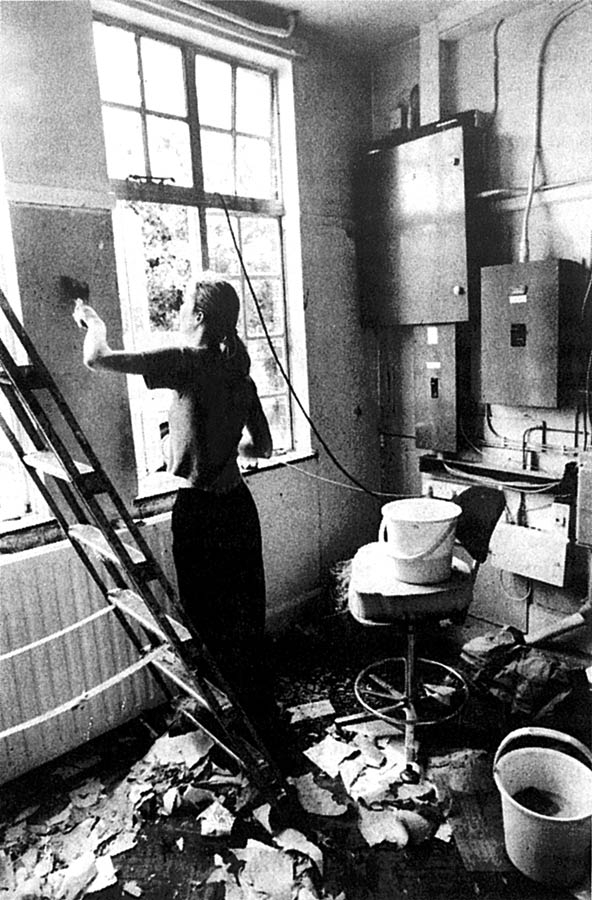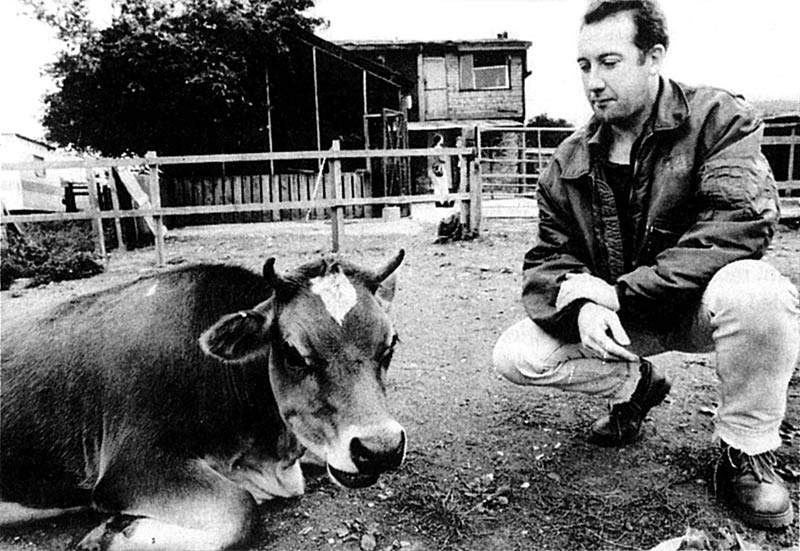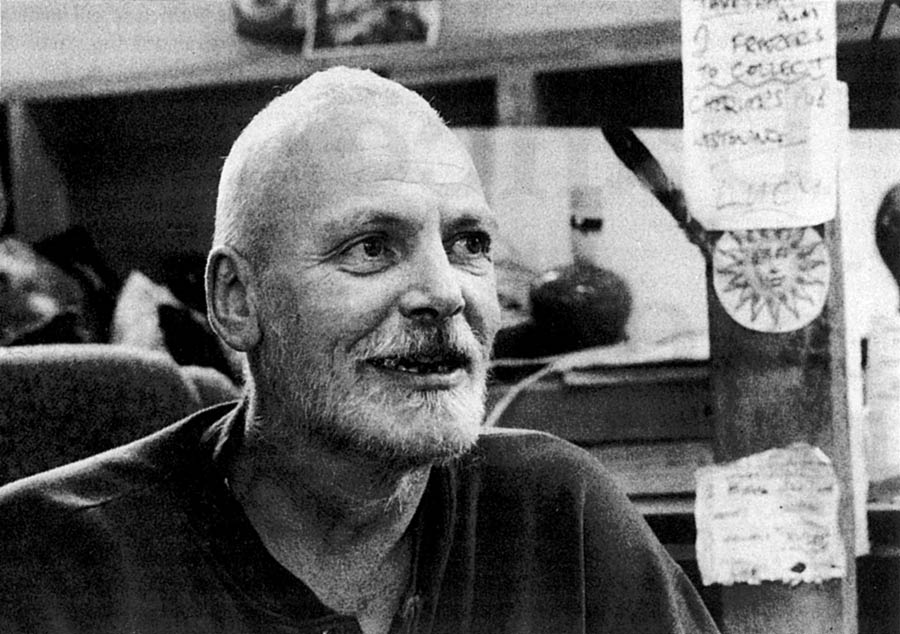
Introducing Exodus - Six-part Special - Pt. 5
ExoDust It Off And Give It Life
Exodus - The Housing Initiative
Squall 8, Autumn 1994, pp. 47-49.
The Oakmore Hotel lies empty again. One and a half years after Kelly Construction told the court they required immediate possession and one and a half years since the riot police smashed their way in.
Despite having restored the derelict property as housing, the occupants - all members of the Exodus Collective - were evicted into the winter snow of 1992. It is derelict once more and kids have smashed the windows once again.
"Sixteen people put £10 from their dole money into the kitty and we matched it, sometimes doubling it, from the money received in the donations bucket at the dances." explains Exodus's Glenn Jenkins. "So there was £20-£30 spent on each person's room. We also supplied a communal area with carpet, and the kitchen with units. So the place was up and going within five days. Next thing - 66 old bill come through the door and smash the lot."
Not dissuaded by the heavy hand, Exodus found a disused old people's home on the edge of Luton, squatted the property and renamed it HAZ (Housing Action Zone) Manor.
"It was a principle: We don't stop regenerating derelicts because we've been evicted," affirms Glenn. The difference between the heavy handed reception inflicted on them at the Oakmore Hotel and that received at HAZ Manor, was in the respect for the Collective that had grown amongst the local community. This respect served to pave certain paths in the chambers of the local council. Their initiative in refurbishing the Oakmore Hotel had not gone unnoticed in the area and although officials would not stick their necks out and publicly criticise the violent police eviction, there were some that were now prepared to work behind the scenes to ensure that Exodus's housing initiatives achieved the security of licence status.
Sam, who had previously been employed as an estate agent, found herself best able to deal with the paperwork and licensing agreements for the properties occupied by the Collective. "Who the cap fits let them wear it," she concluded, thus becoming the HAZ manager. From ex-estate agent to Exodus's estate agent:
"Squatting was our fight to get the right to do what we're doing now. We didn't have a big thing about being able to live here free and all that just because the building is not being used. What we were saying was - 'Let us live here and make it our home and we'll pay the rent for it'. But nobody was interested. And it's their loss at the end of the day because now we're in a council property and we only pay a peppercorn rent."
The peppercorn rent they pay to the local authority amounts to £1 a year, as they are now an official housing co-op, registered with a friendly society and recipients of a Housing Corporation mini-HAG grant negotiated, on their behalf by CATCH (Co-operative and Tenant Controlled Housing). Mini HAG's are small scale grants given to refurbish empty properties, the amount of which depends on the number of bed spaces operational as a result of that refurbishment. But as with most of their meetings with the 'official way of doing things', Exodus found a complacency inconsistent with their own forward thinking.
CATCH as well as taking some of the grant money for themselves in management costs, also provided the co-op with shoddy workmen to carry out the necessary refurbishment, despite the fact that they themselves had both the experience and willingness to do the work themselves.
"They wouldn't let us do the work," says Captain, who lives at the Manor with his 17 year old son Randy and was a building contractor for 17 years previous to his involvement with the Exodus. "We pushed and pushed but CATCH kept saying that our quality of workmanship was unknown.
Jeff Ruffles, the project manager, said he would employ a firm which he had used in the past. And it turns out they were a right bunch of Billy Bodgers - getting quite a lot of money but I would say they were about DIY/labourer standard. We turned round to him and said - 'If that's the quality of workmanship required, we could do that with our eyes shut', but he took no notice."
Captain helped with the refurbishment of the Oakmore Hotel and continues to work on HAZ Manor despite a spinal injury caused by a police sledgehammer during the eviction of the Oakmore. In the room he occupies at the Manor, Captain has built a mezzanine floor, as well as constructing a large communal fireplace in the Manor and a crazy paving patio outside. His expertise is obvious to any observer.
When CATCH suddenly said that maybe the whole project was going to cost too much money and that perhaps they would keep the grant money themselves and forget the Manor, he set to work fixing the roof and teaching Exodus members to cut and place glass windows.
"That's the thing," says Nobby, another Exodus member and habitee at the Manor: "There are the people here willing to teach and there are the people here willing to learn. Captain knows how to do this stuff but CATCH said - 'we don't want you to do anything to the place'. In the end Captain taught me how to cut glass and I helped replace the windows."

The replacement of the windows was no small job. When Exodus moved in, nearly every window was smashed. The building contains about 50 frames, each containing around twenty small 12" by 8" squares requiring a separate pane of glass. Along with repairs to the roof, the Collective ended up saving around £6,000 in contractors' fees by doing it themselves. This didn't prevent the work, carried out by the contractors brought in by CATCH, from using up £46,000 of grant money. The contractors also ended up charging another £16,000 in extras, which CATCH tried unsuccessfully to claim back from the Collective. The contractors installed hot water, electricity and gas and the built three small kitchens. The rest of the building still requires complete refurbishment, which the Collective will now carry out using the money from the small rents they charge, matched with money from the general Exodus fund. The fact that the outside contractors left the large communal kitchen unfinished, has meant that the local council will only pay half the housing benefits for the unemployed tenants. The Collective are now working on the building after nearly a year of stalled and inadequate refurbishment.
"The contractors did the front bit now we're gonna do up the back because there's a lot of space back there that could be utilised into bed spaces," says Sam. "We've decided - they've done what they've done and now we'll use the income we get to do our own job and then we'll compare the two." Her most recent work as co-ordinator of the housing co-op side of Exodus, involves negotiations on the legal future of the Manor and particularly the lease that expires in May 1996.
"When we moved in and squatted the old Hospice - the district council wanted to evict us, but because Luton Borough Council were backing us and negotiating on our behalf with the county council, they didn't have much choice in the matter but to let us stay there. So they went for the shortest possible lease. Give us a chance to prove ourselves and then re-negotiate. We're looking to re-negotiate now."
Sam is also attempting to secure co-operative status for Exodus's other ongoing regeneration project, Long Meadow Farm in nearby Cholton. This farm lay derelict for years on a piece of land purchased by the Department of Transport, who originally planned to use it for a road construction associated with the M1. The works were never carried out and the farm deteriorated. If you walk around the farm today however, you'll see new barns re-built from old pallets - housing goats, sheep, chickens, geese and two generations of Vietnamese pot belly pigs.
"There's a local factory that gets plastic brought in on pallets, so we go down there, pick the pallets up and recycle them into farm buildings," explains Stuart another devoted Exodus worker: "I helped build some of them barns - that's something that I've been able to do - never before had the opportunity. When we come into these derelict places we see what it could be. We've got vision. Nothing is beyond us. I didn't think I could build a barn and now I've helped build a farm."
Jaqui, a mother of two, assists Sam at the manor and is secretary of the farm, sorting out matters such as calling in vets and paying their bills. She had been employed for six years as an office worker in a local Marks and Spencer warehouse before being made redundant.

"I was roboted up in that job," she remembers. "Getting up at 6.30am to put the kids in the nursery and then getting to work by eight and working 'til five - coming home and then doing the housework." The combination of leaving that job and helping to form Exodus was, according to Jaqui, like "taking off robot clothes and becoming more herself". She has no doubt about the positive benefits of her change of focus. "Makes being a mum so much easier. I can't afford to take them anywhere but now, with the whole of Exodus, they're helping out on the farm instead of hanging round the streets damaging bus shelters! I enjoy the dances but they are a small part of it. I work when I want to and I believe in the cause that I'm working for, so I actually enjoy working." It was no small pleasure to Jaqui when she found herself distributing water to dancers, from the very warehouse where she had once worked for Marks and Spencer's, now unused except for Exodus dances!
Jaqui's work also helps to ensure that other local children can benefit from the experience of the farm, just as her children do. Long Meadow World Community Free Farm is open to parties from local schools and the farm animals are sometimes taken to a Luton park to participate in a funday for children, organised by Exodus in conjunction with a local council estate resident's association.
Although owned by the DoT, the property is managed by Circle 33 housing association, the parent association of CATCH, before CATCH recently closed down.
"Circle 33 effectively got us the grant on the Manor, although CATCH was what they operated through to get it," explains Sam: "So we want to take over the management of the farm in the same way, under the HAZ umbrella. Then obviously the next step is to find another building that we can do up."
Exodus's sights are set again and this time their gaze is directed on a derelict community centre inside Luton itself. This time however, they find themselves in a position to try asking first. With two up and running examples of what they can do 'given half a chance', it will be a lot harder for local officials to find objections to their proposals.
"We wouldn't necessarily need to squat now to make our point," says Sam: "We can go to them first and say - Look this is what needs to be done and we've proved that it works."
In the world of squatting, this is a luxurious position but it's a position Exodus have earned through sheer persistence and through the cultivation of local support rarely achievable by many squatters who are constantly moved from area to area. "Chances are you would have to squat 'cause local councils wouldn't normally give over a place like the Manor," adds Steve, another Exodus member involved in rebuilding the farm. "What we're setting here is a precedent."
Although the local authorities have turned down their first draft plan for the community centre, Exodus are optimistic that a more developed proposal for the derelict community centre, recently re-submitted to the district council, will produce a more positive response. Whether or not permission is forthcoming, the Collective intend to continue with their regenerations.
"If they say no, then we'll either look for somewhere else or decide whether to move in any way," says Sam, firmly. No derelict shells are safe from Exodus's cobweb brush including, it seems, the dusty and decaying procedures of local bureaucracy.
Related Articles
Exodus Special - In This Issue::
A Now New Testament
Introducing Exodus
Exodus - The Battles
Exodus - A Chronology
Exodus - The Housing Initiative
Exodus - The Dances
To see Squall's full coverage of Exodus click here
